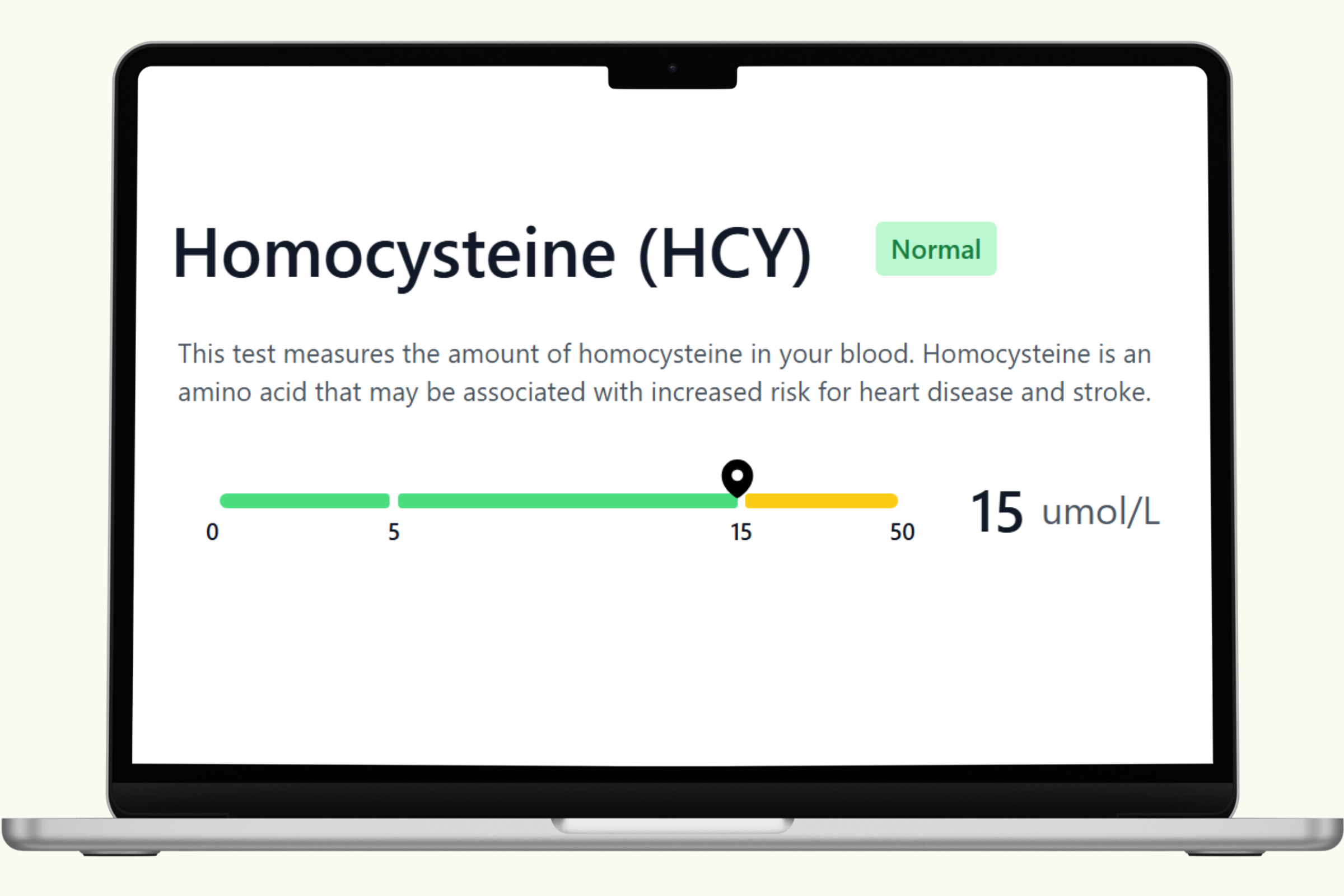Homocysteine Blood Test: A Key Marker for Methylation and Heart Health
The Homocysteine Blood Test, part of the PlexusDx Methylation Panel, measures levels of homocysteine, an amino acid produced during protein metabolism. While the body naturally generates homocysteine, elevated levels can signal underlying nutrient imbalances—particularly deficiencies in folate, vitamin B12, or vitamin B6. These nutrients are essential cofactors for converting homocysteine into methionine, a process vital for methylation, cardiovascular health, and detoxification.
Testing homocysteine offers a powerful window into your overall metabolic health. Elevated levels have been linked to cardiovascular disease, cognitive decline, and pregnancy complications, while optimal levels support healthy methylation, DNA stability, and energy production. Paired with folate and vitamin B12 testing, this panel provides a clear, comprehensive view of nutrient balance and methylation function.
What is Homocysteine?
Homocysteine is a sulfur-containing amino acid formed during the metabolism of methionine, an essential amino acid found in protein-rich foods. Normally, homocysteine is recycled into methionine or converted into cysteine with the help of key B vitamins. However, when these nutrients are lacking—or when genetic variations like MTHFR affect methylation efficiency—homocysteine levels may rise, disrupting metabolic balance.
Why is Homocysteine Important?
Healthy homocysteine levels are critical because elevated concentrations have been associated with:
- Cardiovascular disease – high homocysteine can damage blood vessel linings, promote clot formation, and increase oxidative stress.
- Cognitive decline – elevated levels have been linked to memory loss, dementia, and Alzheimer’s disease.
- Pregnancy complications – including neural tube defects, preeclampsia, and recurrent miscarriage.
- Methylation imbalance – impaired detoxification, neurotransmitter production, and DNA repair.
Because homocysteine integrates multiple nutritional and metabolic pathways, testing it provides a unique and valuable measure of overall functional health.
Common Symptoms of Elevated Homocysteine
Many people with elevated homocysteine may not experience obvious symptoms at first. Over time, however, imbalances may contribute to:
- Chronic fatigue and low energy
- Mood changes such as depression or irritability
- Memory issues or brain fog
- Tingling or numbness in hands and feet (linked with B12 deficiency)
- Signs of cardiovascular strain such as high blood pressure
Homocysteine Blood Test Reference Ranges
Standard laboratory reference ranges vary, but common benchmarks include:
- Normal Range: 4 – 15 µmol/L
- Optimal Functional Range: 6 – 8 µmol/L
Levels above 15 µmol/L are generally considered elevated and may indicate higher risk for cardiovascular and neurological conditions. Functional medicine practitioners often aim for tighter control in the 6–8 µmol/L range to optimize long-term health and methylation balance.
Who Should Get a Homocysteine Blood Test?
Testing homocysteine is recommended for individuals who:
- Have a family history of heart disease, stroke, or dementia
- Experience unexplained fatigue, mood issues, or brain fog
- Are pregnant or planning pregnancy
- Follow restrictive diets (vegan or vegetarian) that may lack B12
- Take medications that interfere with B-vitamin metabolism, such as metformin or proton pump inhibitors (PPIs)
- Have known MTHFR or other methylation-related genetic variants
How the At-Home Test Works
PlexusDx makes it easy to measure homocysteine levels from the comfort of your home. Using a simple dried blood spot collection on an ADX card, you provide a finger-prick blood sample, apply a few drops to the card, and mail it back in a prepaid envelope. The laboratory processes your sample quickly and delivers results securely online, saving you time and making advanced health testing accessible without a clinic visit.
Interpreting Your Results
- Low Homocysteine: May indicate excellent B-vitamin status or, rarely, excess methylation activity. Generally considered a positive finding.
- Optimal Homocysteine: Between 6–8 µmol/L, reflecting balanced methylation and nutrient sufficiency.
- Elevated Homocysteine: Often linked to folate, B12, or B6 deficiency, genetic methylation challenges, or increased oxidative stress. May require diet or supplementation support.
How to Support Healthy Homocysteine Levels
If your results show elevated homocysteine, strategies to restore balance include:
- Ensuring adequate intake of folate-rich foods such as leafy greens, beans, and lentils.
- Adding B12-rich foods like fish, poultry, dairy, or fortified plant-based alternatives.
- Supplementing with active forms of folate (L-methylfolate), B12 (methylcobalamin), and B6 (pyridoxal-5’-phosphate) when needed.
- Addressing digestive health issues that may impair absorption of B vitamins.
- Working with your healthcare provider if genetic variants or medications are contributing to elevated levels.
Benefits of Homocysteine Testing with PlexusDx
- Comprehensive analysis: Assesses homocysteine alongside folate and B12 for a complete methylation profile.
- Convenience: At-home dried blood spot collection using an ADX card.
- Quick turnaround: Fast, accurate results delivered online.
- Affordability: HSA/FSA eligible for flexible payment options.
- Actionable reports: Easy to interpret and share with your healthcare provider.
Take Charge of Your Methylation and Cardiovascular Health
The PlexusDx Homocysteine Blood Test is more than a simple lab check—it’s a tool for understanding how your body processes nutrients and maintains cardiovascular and neurological health. By measuring homocysteine levels alongside folate and B12, you can identify imbalances before they progress into serious conditions and take proactive steps to restore balance.
With at-home collection, fast results, and integration into the Methylation Panel, PlexusDx makes it simple to monitor your health and take control of your future well-being.

Share:
Folate (Vitamin B9) Blood Test